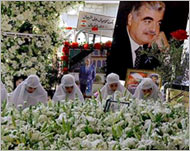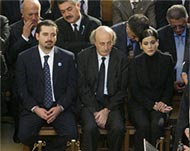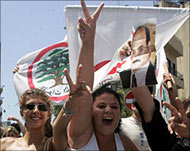Geagea amnesty raises hopes
The release of Christian leader Samir Geagea after 11 years in prison has been seen by many Lebanese as a step towards national reconciliation in a country that has not healed from the wounds of civil war.

“This is a new stage in which Christians, Muslims and Druze will build Lebanon together,” Member of Parliament George Adwan, who is a leading member in Geagea’s Lebanese Forces, told Aljazeera.net.
Adwan said he considered Geagea’s pardon and release on 26 July to be “the result of the Syrian withdrawal” from Lebanon in April.
Syria dominated its smaller neighbour militarily and politically for almost three decades. It pulled out its troops from the country amid international and local pressure that intensified after the assassination of former prime minister Rafiq al-Hariri, a powerful Sunni Muslim, on 14 February.
Geagea was serving three life sentences for assassinating political rivals during the 15-year civil war, including prime minister Rashid Karami, who was killed in 1987 when explosives placed behind his seat in a helicopter went off.
Assassinations
The Christian leader had denied involvement in the killings and insisted that his imprisonment was politically motivated.
 |
|
Lebanese girls pray at the grave |
Some legislators who are campaigning to investigate the killing of al-Hariri and bring the perpetrators to justice voted for Geagea’s release.
“The assassination of al-Hariri is different from that of Karami, which took place when Lebanon was in a state of war,” said Druze legislator Wael Abu Fahour.
“It’s a new era in Lebanon, an era of reconciliation and partnership,” he told Aljazeera.net.
“We forgive each other for anything that happened during the war,” said Telecommunications Minister Marwan Hamadeh, who survived an assassination attempt in October, weeks after he voted against the extension of pro-Syrian President Emile Lahoud’s term for another three years.
Change in stance
Geagea was a hardliner who called for Christian rule in areas dominated by Christians during the civil war. But in recent months, his group has adopted a more moderate approach towards Sunni Muslims and Druze, especially after they united in massive protests calling on Syria to leave the country.
 |
|
MPs (L to R) Saad al-Hariri, Walid |
The Lebanese Forces forged alliances with al-Hariri’s son, Saad al-Hariri, and the group’s former war foe Druze leader Walid Jumblatt, shortly before the parliamentary elections were held in May and June for the first time without the Syrian presence in the country.
Since then, Lebanese Forces officials have been calling Muslims “our partners in the homeland”.
The new parliament, which is overwhelmingly anti-Syrian, voted on 18 July for an amnesty for Geagea. The 14 legislators representing the Shia Muslim group Hizb Allah and other pro-Syrian MPs walked out of the vote.
Legal case
Hizb Allah lawmaker Mohammed Raad said his parliamentary bloc had left because of the case’s political sensitivity.
Hizb Allah’s main backer, Iran, has also announced it will take legal action against Geagea for kidnapping four Iranian diplomats in Beirut during the war.
 |
|
Supporters of Samir Geagea |
But legislator Sitrida Geagea, the wife of the Christian leader, said outside the parliament after the majority of legislators voted for her husband’s amnesty: “This national unanimity that happened today indicates the Lebanese people’s will to turn the page of the war once and for all and to head toward the future.”
Geagea was the only militia leader to be tried for crimes during the civil war, including the killing of the leader of the Christian National Liberal Party Dany Chamoun with his wife and two young children.
Other militia leaders were not charged of any war crimes after the General Amnesty Law was promulgated by the Lebanese government in 1991 granting immunity from prosecution to all militias and armed groups.
About 120,000 people were killed in the war, and more than 17,000 civilians disappeared and remain missing.
The amnesty excluded “crimes of assassination or attempted assassination of religious figures, political leaders, and foreign or Arab diplomats”.